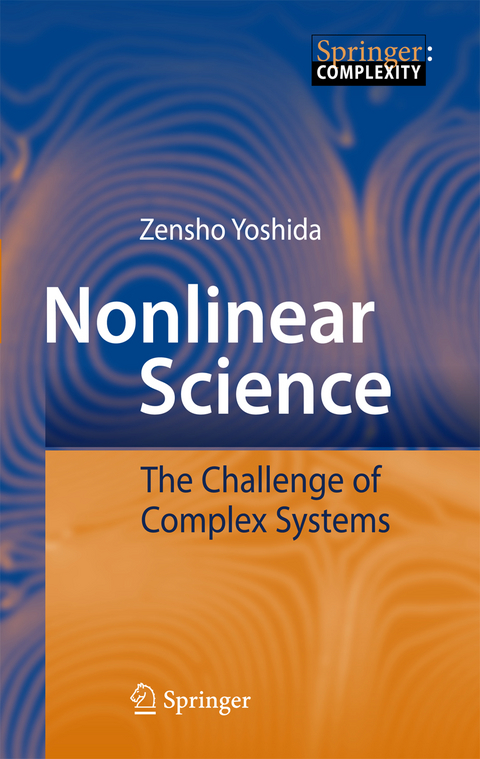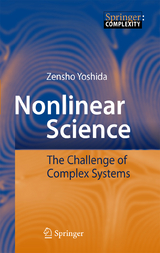Nonlinear Science
The Challenge of Complex Systems
Seiten
2010
|
2010
Springer Berlin (Verlag)
978-3-642-03405-3 (ISBN)
Springer Berlin (Verlag)
978-3-642-03405-3 (ISBN)
Modern science has abstracted, as compensation for establishing rigorousness, the complexity of the real world, and has inclined toward oversimpli?ed ?ctitious n- ratives; as a result, a disjunction has emerged between the wisdom of science and reality. Re?ecting on this, we see the need for science to recover reality; can it reveal new avenues for thought and investigation of the complexity? The study of science is the pursuit of clarity and distinctness. Physics,after Galilei placed it in the realm of mathematics, has been trying to establish clearness by mathematical logic. While physics and mathematics, respectively, have different intellectual incentives, they have intersected in history on countless occasions and have woven a ?awless system of wisdom. The core of rigorous science is always made of mathematical logic; the laws of science cannot be represented without the language of mathematics. Conversely, it is undoubtedly dif?cult to stimulate ma- ematical intellect without a reference to the interests of science that are directed to the real world. However, various criticisms have been raised against the discourses of sciences that explain the events of the real world as if they are "governed" by mathematical laws. Sciences, being combined with technologies, have permeated, in the form of technical rationalism, the domain of life, politics, and even the psychological world. The criticisms accuse seemingly logical scienti?c narratives of being responsible for widespread destruction and emergence of crises, unprecedented suffering of hum- ity.
Professor Yoshida's contributions range from the mathematical physics to leading an experimental team of plasma physics. He has studied the self-organization of structures in plasmas using various theoretical methods such as variational principles, singular perturbation theory, operator theory, functional analysis, topological methods, etc., and, in particular, is well known for important contributions to the mathematical theory of the curl operator, which he has developed to extend and deepen the understanding of nonlinear structures in general vortex dynamics systems.
What is NONLINEAR?.- From Cosmos to Chaos.- The Challenge of Macro-Systems.- Interactions of Micro and Macro Hierarchies.
From the reviews:
"The usefulness of the book is as a good auxiliary textbook for such courses as Mathematical Modeling, Dynamical Systems, Equations of Mathematical Physics." (Vladimir Rasvan, Zentralblatt MATH, Vol. 1195, 2010)| Erscheint lt. Verlag | 5.3.2010 |
|---|---|
| Zusatzinfo | XI, 211 p. |
| Verlagsort | Berlin |
| Sprache | englisch |
| Maße | 155 x 235 mm |
| Gewicht | 458 g |
| Themenwelt | Mathematik / Informatik ► Informatik ► Theorie / Studium |
| Mathematik / Informatik ► Mathematik ► Angewandte Mathematik | |
| Naturwissenschaften ► Physik / Astronomie ► Astronomie / Astrophysik | |
| Naturwissenschaften ► Physik / Astronomie ► Mechanik | |
| Naturwissenschaften ► Physik / Astronomie ► Theoretische Physik | |
| Naturwissenschaften ► Physik / Astronomie ► Thermodynamik | |
| Schlagworte | Chaos • Complex System • Complex Systems • Nonlinear • Scale-hierarchy • Self-Organization |
| ISBN-10 | 3-642-03405-5 / 3642034055 |
| ISBN-13 | 978-3-642-03405-3 / 9783642034053 |
| Zustand | Neuware |
| Haben Sie eine Frage zum Produkt? |
Mehr entdecken
aus dem Bereich
aus dem Bereich
was jeder über Informatik wissen sollte
Buch | Softcover (2024)
Springer Vieweg (Verlag)
37,99 €
Grundlagen – Anwendungen – Perspektiven
Buch | Softcover (2022)
Springer Vieweg (Verlag)
34,99 €
Eine Einführung in die Systemtheorie
Buch | Softcover (2022)
UTB (Verlag)
25,00 €




